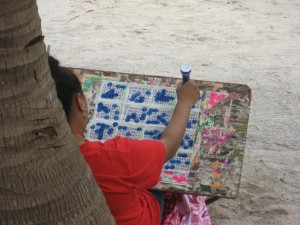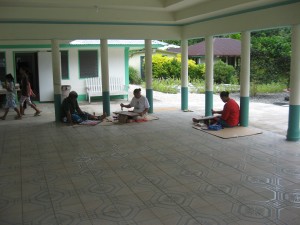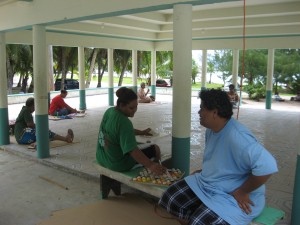Although living on a small, sparsely populated island certainly has its perks, a major drawback is the lack of formalized entertainment. Now don’t get me wrong, the hiking and snorkelling here is absolutely fantastic, but on the days when you’re not feeling particularly athletic or energized, there are not of opportunities for what I’d call “lazy activities”. Ta’u doesn’t have a movie theatre, a shopping mall, or any other place where you can enjoy the dual benefits of occupying your time while also enjoying the cool touch of air conditioning (is it still too early in the year for you to be thinking about that? It’s a daily consideration out here…) So, on a lazy Saturday afternoon, when you might consider going to see a film, or going to window shop, many Samoans turn to bingo. Bingo, as it turns out, is immensely popular with Samoans, especially out here in Manu’a, when there is often very little else to do.
Now, I didn’t frequent the Montreal bingo scene all that often, but when I did I was amazed at how focused and coordinated some the players were; I never understood how people old enough to be my great-grandparents had the focus and coordination to play four or five sheets per game, while I struggled with only one. Although there are certainly many cultural differences between Samoans and Canadians, bingo is not one of them. The demographics are about the same; most bingo players out here are women, and the average age is pretty high. The competitive nature is also the same; competitors (because that’s what I suppose they are) sit with huge boards in the laps, and play as many as sixteen bingo sheets per game, I find it truly astounding. Bingo is serious business out here, and hosting a round of bingo games is a big deal. Players even go so far as to compare different “bingo hosts” on a variety of things, including the quality of their prizes.
Now, as I said before, I’m no expert at bingo, seeing as most of my bingo experience happened before I started middle school, but having watched many bingo games out here, I have begun to appreciate the coordination involved to run a smooth game. It all starts with the number-caller (my designated title for the position): the quarterback of the bingo world. A quality number-caller has to be loud (without being obnoxious), has to be clear, and has to have rhythmic ability. Calling the numbers too slowly or too quietly will bore and/or aggravate the players, calling the numbers too quickly or not clearly enough will confuse and/or overwhelm them. The number-caller is the top spot, the pressure cooker, and having a good one is critical to hosting a successful bingo game.
Beyond the number-caller, a good bingo game needs at least a couple of runners (again, my designated title). Runners are the ones who come to certify your win as you spastically shout “BINGO!”, but they are also the ones who run around as games are in progress to sell your the sheets that you will use for the following game. Runners need to be quick and organized, but more than anything else, they need to be strong and not easily intimidated, in the event that someone calls a “false-bingo”. Being a runner is serious, and from what I gather people out here are paid to be runners for bingo games.
Location isn’t a huge deal for bingo games in Ta’u. While Bingo Halls are all the rave in North America, most people out here just host bingo games in the equivalent of their front yard, and players usually sit on the ground, usually somewhere that is shady but still close enough to hear the numbers being called.
One afternoon, sometime back in either September or October, I decided that I would spend my Saturday afternoon playing bingo with the locals. I had seen them out playing virtually every Saturday since I had first arrived, and I was eager to join in. With a pocket full of dollar bills, I seated myself down on the ground, eagerly waiting to kick serious ass (because, of course, bingo is all about skill). A runner soon came by and gave me a couple of sheets. While I was initially hesitant to play multiple bingo sheets at once, I figured I might as well go big; they had only cost a dollar anyway.
In order to properly lay out my bingo sheets for optimal viewing, I had thought ahead and brought with me a large piece of cardboard; it was what I considered to be a stroke of genius, I wasn’t just another silly palagi (Samoan word for white person) amateur. It didn’t take very long for me to realize how much of an amateur I was, however, and just as the game was about to begin, a gust of wind passed through and blew my bingo sheets away. As I quickly learned, a true Samoan bingo professional brings with him/her, in addition to a piece of cardboard, either a glue stick or a roll of tape to affix the bingo sheets solidly to the cardboard, thereby negating the possible threat of unexpected gusts of wind. Thankfully, another player (no doubt calling me a palagi amateur in her head) managed to grab my sheets as they blew past her, and she loaned me her glue stick to prevent it from happening again.
As I sat back down in my battle-station (because, of course, playing bingo is like going to war), I assumed the ready position, with my cardboard in my lap (with my bingo sheets securely glued), my bingo stamp in my right hand, and my left arm positioned in such a manner to wave uncontrollably in the event that I got a bingo (which, I thought at the time, was not a question of “if” but rather “when”). I was ready, the other players were ready: it was bingo time.
Now, as I have already mentioned, while I am certainly no expert, I have had some experience playing bingo, and I was usually pretty “good” at it. One thing that I always took for granted, however, was that whenever I used to play bingo, the number-caller would always call out the numbers in English. The moment my first game of Samoan bingo began, I knew I was in trouble. Although I had watched numerous games in passing, I hadn’t really ever paid enough attention to realize that the games were always in Samoan. This was further compounded by the fact that the number-caller seemed to be calling a new number every five seconds (which I felt was a tad too quick, and subsequently confused and overwhelmed me, as per my earlier analysis). I quickly realized that if I was going to fulfill my prophecy of victory, I was going to need some help, because although I had learned the numbers 1-10 in my WorldTeach orientation, I was pretty much at a loss after that. I asked a lady sitting near me if she wouldn’t mind translating the numbers for me, offering half of my prize when I won (again, “when” not “if”). She agreed, although it did not seem as though she was particularly eager to do it (probably partially due to her competitive nature, partially because it must be seriously aggravating to translate every number called in a game of bingo to someone else while you’re also trying to play).
And so it was, that after missing quite a few numbers (no doubt killing any chance I had of winning that particular game), I had settled into a routine: the number-caller would call out a number, the lady sitting beside me would quickly translate the number to me while at the same time stamping her board, and I would do my best to try and stamp my board before she translated the next number to me. There was no time to ask for repetition, so you can imagine how focused I had to be in order to make sure I heard and understood every number being called. I was so focused, in fact, that I was not prepared when a runner came by and asked me if I wanted to buy sheets for the next game. I had just assumed that once someone called a bingo, there would be a short break to buy new sheets for the next game. That was not the case, apparently, and so as I was struggling to make sure I was following the translation of each number called, I used the fraction of a second between numbers to talk to the runner.
“Yes……can I……..have………two sheets……..fa’amolemole” (Samoan for please)
Of course, I also hadn’t given any thought to how I was going to pay for the sheets. My “wad” of dollar bills was neatly tucked in my pocket, and I couldn’t get it out without potentially losing my concentration and missing another number. It didn’t seem like the runner was going to give me the sheets on credit, so as she stood in front of me, no doubt waiting for me to pay-up, I finally gave-in and dug around for a couple of dollars, at the same time missing what seemed like three or four more numbers called. Had I paid more attention before I began playing, I would have noticed that all the players around me had conveniently tucked dollar bills between their toes, so that when a runner came by they would simply pluck the money out of their toes and give them the sheets (although I think it’s a little unhygienic, it’s actually pretty ingenious when you think about it).
I played for a few more rounds, but ended up walking home empty-handed. Although I had been a bingo champion in elementary school classrooms in the mid to late 90s, I was simply not conditioned enough for Samoan bingo. I never came close to winning, but if I had magically gotten a bingo, I would most likely have still been disappointed. I don’t know if this is a rule for Canadian bingo, but in Samoan bingo, you can only win if you get a bingo on the last number called, if you get a bingo, but they call another number before you can shout it out, apparently it doesn’t count. This can be especially problematic when you need translation, and are a few steps behind everyone else.
I haven’t played another game of Samoan bingo since that afternoon, the stress is too much for me, but whenever I see a game I always stop by and practice my Samoan numbers.




